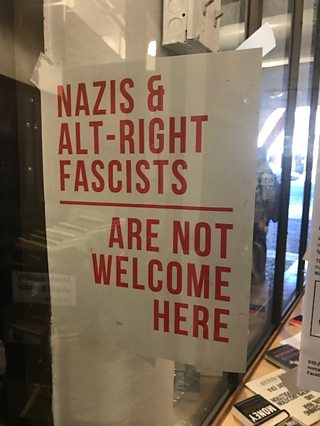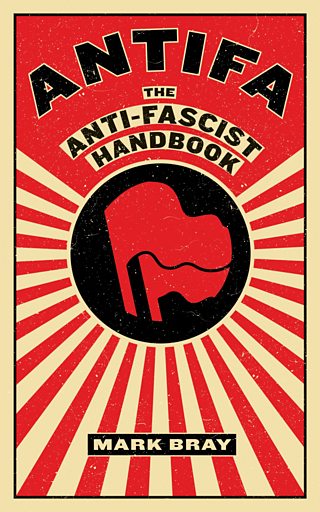Seven things you need to know about Antifa
Online battles between far right groups and anti-fascists – or "Antifa" – are now regularly spilling out onto the streets of America. But who are Antifa and what do they represent? Anisa Subedar and Mike Wendling went to the West coast of America to find out for Seriously... podcast Political Violence in America. Here are seven facts you need to know.

1. How long have Antifa been around?
Some Antifa groups date the origins of their movement to fights against European fascists in the 1920s and 1930s. Mark Bray, author of Antifa: The Anti-Fascist Handbook, says the modern American Antifa movement began in the 1980s with a group called Anti-Racist Action. Its members confronted neo-Nazi skinheads at punk gigs in the American Midwest and elsewhere. By the early 2000s the Antifa movement was mostly dormant - until the rise of Donald Trump and the alt-right.
2. How do you pronounce Antifa?
According to Bray, there are multiple different pronunciations. In the United States most people say an-tee-fa. In Europe it’s sometimes referred to as anti-far, which Bray believes has been influenced by the Italian word antifascismo. He says an-tee-fa but doesn’t correct people who pronounce it differently.
3. What are they opposed to?
Neo-Nazis, Neo-fascism, white supremacists and racism, and these days the movement that encapsulates some of those ideas: the alt-right.
We spoke to secret Antifa groups in Oregon. They said they come from a variety of political backgrounds but they were united in their opposition to fascism, and they have an anti-government streak. They said they see creeping authoritarianism in the current American administration that they are looking to build "a movement that really insulates us from the policies of Donald Trump".
"It's not just resisting the federal administration but also resisting moves that can lead to fascism," one member told us, "and those happen locally whether from local officials or from local alt-right movements."
4 Why do they all dress in black?
Like other protest movements dating back to Cold War era West German anarchists, Antifa supporters will often dress all in black, sometimes covering their faces with masks or helmets so they can’t be identified by opposing groups or the police. It's an intimidating tactic – known as a "black bloc" – which also allows them to move together as one anonymous group. There are also offshoots - one Antifa group in Oregon said they also have a "snack bloc" of people who provide food and water for their allies during protests.

5. What tactics do they use?
Antifa look to disrupt alt-right events and far-right speakers. They use a variety of tactics to do this – including shouting and chanting and forming human chains to block off right-wing demonstrators. Some are unapologetic about their online tactics, which include monitoring the far right on social media. They also release personal information about their opponents online, commonly known as "doxxing" – they’ve gotten some alt-right supporters fired from their jobs after identifying them online.
Antifa groups also use more traditional forms of community organising like rallies and protest marches. The most extreme factions will carry weapons like pepper spray, knives, bricks and chains – and they don’t rule out violence.
6: How violent are they?
Their willingness to use violence marks out Antifa from many other left-wing activists, although the Antifa members we spoke to said they denounce the use of weapons and violent direct action. They said if violence does occur, it’s as a form of self-defence. They also make historical arguments to justify their position. For instance, they ask, what if opponents of the German Nazi Party had been more forceful in their opposition in the 1930s, could World War Two and the Holocaust have been averted?
Antifa have been directly and sometimes physically confronting the far right on the streets and, in some cases, they have been successful in postponing, cutting short or cancelling rallies and speeches up and down America.
7. Do women join Antifa groups?
Traditionally direct street action has been a mostly male domain, but significant numbers of women are members of Antifa groups and have been arrested at counter-demonstrations against the alt-right in California and elsewhere. Female members of Antifa groups told us they view the current administration as being anti-women. They point to White House policies on immigration, affordable health care, abortion rights and voting rights and say they disproportionately affect women and minorities. We spoke with Sunsara Taylor from the Antifa group Refuse Fascism who told us women are motivated to respond to "what hits them".
-
![]()
Political Violence in America
Download the podcast from Seriously...
More from Seriously...
-
![]()
Why Ian McMillan loves being early
The early-bird poet and broadcaster tries to arrive early to everything.
-
![]()
Fake wine – honestly, it’s a thing
Here’s what Radio 4 has uncorked about the fake wine industry.
-
![]()
Five Steps to the Creative World of Cosplay
An insight into the world of fictional characters brought to life by devoted fans.
-
![]()
The death and rebirth of Zora Neale Hurston
Once forgotten, she is now revered by everyone from Alice Walker to Solange Knowles
-
![]()
Seven of literature's lustiest lovers
From Tom Jones to Adrian Mole, have a look at lust in literature.
-
![]()
Meet the cyborgs
Five people who have modified their bodies with technology.
-
![]()
Miles Jupp asks if a woman invented James Bond...
Phyllis Bottome is little known today, but did she inspire Ian Fleming?
-
![]()
Five ways to burst your social media bubble
DJ and presenter Bobby Friction on how to escape the online echo chamber.
-
![]()
The Story of The Green Book, by Alvin Hall
A travel guide like no other, for black motorists in the mid-20th Century it was a catalogue of refuge.
-
![]()
Apathy in the UK by Phill Jupitus
The comedian and broadcaster on boredom.
-
![]()
What is a 'curvalicious' body?
Bridgitte Tetteh explores attitudes to female bodies in the black community.
-
![]()
Sitting for David Hockney
Art critic Martin Gayford learns what it's like to be painted by a modern master.
-
![]()
Why having a baby needn’t subdue your inner geek
Five tips from Isy Suttie.
-
![]()
Miles Davis on canvas
The legendary trumpeter's second life as a painter.
-
![]()
Ey Up! It's The Sex Pistols
The Sex Pistols visited Yorkshire twice, but what impression did they leave?
-
![]()
William Shakespeare's America
Robert McCrum traces the Bard's influence in the USA.
-
![]()
Three-Sided Football, A Sport for Anarchist
Ian McMillan watches from the side lines in South London
-
![]()
Why Do Dancers Die Twice?
Should professional dancers careers have to be so brief?
-
![]()
Is Mindfulness Meditation Dangerous?
Jolyon Jenkins investigates whether meditation can do you more harm than good.




















